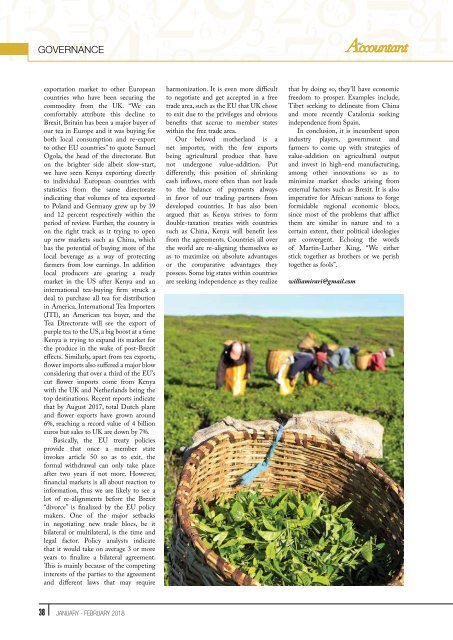The-Accountant-Jan-Feb-2018
You also want an ePaper? Increase the reach of your titles
YUMPU automatically turns print PDFs into web optimized ePapers that Google loves.
Governance<br />
exportation market to other European<br />
countries who have been securing the<br />
commodity from the UK. “We can<br />
comfortably attribute this decline to<br />
Brexit, Britain has been a major buyer of<br />
our tea in Europe and it was buying for<br />
both local consumption and re-export<br />
to other EU countries” to quote Samuel<br />
Ogola, the head of the directorate. But<br />
on the brighter side albeit slow-start,<br />
we have seen Kenya exporting directly<br />
to individual European countries with<br />
statistics from the same directorate<br />
indicating that volumes of tea exported<br />
to Poland and Germany grew up by 39<br />
and 12 percent respectively within the<br />
period of review. Further, the country is<br />
on the right track as it trying to open<br />
up new markets such as China, which<br />
has the potential of buying more of the<br />
local beverage as a way of protecting<br />
farmers from low earnings. In addition<br />
local producers are gearing a ready<br />
market in the US after Kenya and an<br />
international tea-buying firm struck a<br />
deal to purchase all tea for distribution<br />
in America. International Tea Importers<br />
(ITI), an American tea buyer, and the<br />
Tea Directorate will see the export of<br />
purple tea to the US, a big boost at a time<br />
Kenya is trying to expand its market for<br />
the produce in the wake of post-Brexit<br />
effects. Similarly, apart from tea exports,<br />
flower imports also suffered a major blow<br />
considering that over a third of the EU’s<br />
cut flower imports come from Kenya<br />
with the UK and Netherlands being the<br />
top destinations. Recent reports indicate<br />
that by August 2017, total Dutch plant<br />
and flower exports have grown around<br />
6%, reaching a record value of 4 billion<br />
euros but sales to UK are down by 7%.<br />
Basically, the EU treaty policies<br />
provide that once a member state<br />
invokes article 50 so as to exit, the<br />
formal withdrawal can only take place<br />
after two years if not more. However,<br />
financial markets is all about reaction to<br />
information, thus we are likely to see a<br />
lot of re-alignments before the Brexit<br />
“divorce” is finalized by the EU policy<br />
makers. One of the major setbacks<br />
in negotiating new trade blocs, be it<br />
bilateral or multilateral, is the time and<br />
legal factor. Policy analysts indicate<br />
that it would take on average 3 or more<br />
years to finalize a bilateral agreement.<br />
This is mainly because of the competing<br />
interests of the parties to the agreement<br />
and different laws that may require<br />
harmonization. It is even more difficult<br />
to negotiate and get accepted in a free<br />
trade area, such as the EU that UK chose<br />
to exit due to the privileges and obvious<br />
benefits that accrue to member states<br />
within the free trade area.<br />
Our beloved motherland is a<br />
net importer, with the few exports<br />
being agricultural produce that have<br />
not undergone value-addition. Put<br />
differently, this position of shrinking<br />
cash inflows, more often than not leads<br />
to the balance of payments always<br />
in favor of our trading partners from<br />
developed countries. It has also been<br />
argued that as Kenya strives to form<br />
double-taxation treaties with countries<br />
such as China, Kenya will benefit less<br />
from the agreements. Countries all over<br />
the world are re-aligning themselves so<br />
as to maximize on absolute advantages<br />
or the comparative advantages they<br />
possess. Some big states within countries<br />
are seeking independence as they realize<br />
that by doing so, they’ll have economic<br />
freedom to prosper. Examples include,<br />
Tibet seeking to delineate from China<br />
and more recently Catalonia seeking<br />
independence from Spain.<br />
In conclusion, it is incumbent upon<br />
industry players, government and<br />
farmers to come up with strategies of<br />
value-addition on agricultural output<br />
and invest in high-end manufacturing,<br />
among other innovations so as to<br />
minimize market shocks arising from<br />
external factors such as Brexit. It is also<br />
imperative for African nations to forge<br />
formidable regional economic blocs,<br />
since most of the problems that afflict<br />
them are similar in nature and to a<br />
certain extent, their political ideologies<br />
are convergent. Echoing the words<br />
of Martin-Luther King, “We either<br />
stick together as brothers or we perish<br />
together as fools”.<br />
williamirari@gmail.com<br />
38 JANUARY - FEBRUARY <strong>2018</strong>

















